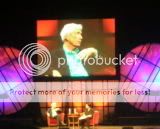Writing tips from the Festival of Books
I brought home a grab-bag of goodies from the L.A. Times Festival of Books. Are you interested? Grab a cup of coffee and pull up a chair.
Memoir: What Shapes Us – what happened, and what it means
Panelists: Mark Doty, Bich Minh Nguyen, Emily Rapp, Clancy Sigal
A memoir
-
isn’t a work of history, but rather, a work of memory.
-
is elastic by nature, stretching the time-space continuum to suit the story and/or theme.
-
is a shaped narrative that attaches meaning to facts and dates.
-
isn’t the author; it’s an artifact.
-
is an artistic relationship with the truth.
Advice for writers
-
Don’t wait until people are dead to write your memoir. You could die before your book gets written.
-
Understand why you need to tell your story.
-
If you try to create a universal theme, you risk writing a bland bookful of overgeneralizations. Be specific, so your readers can learn and/or relate.
-
Begin not with what you don’t remember; instead, start with things you can’t forget.
-
We can’t know for sure that we’re fairly depicting our relationships with others.
-
Don’t underestimate the fact that your unconscious self has already been working on your memoir.
-
The more you revise, the more distance you place between yourself and your memories.
-
Take a look at these two articles: Publish, Then Flee: How to tell your family you’re writing about them and All About Me? The state of the modern memoir.
Nonfiction: Humor and Attitude
Panelists: Samantha Dunn, Larry Miller, Neal Pollack, Jill Soloway
-
Humor = channeled humiliation. Example: If you slip on a banana peel, people will laugh at you. If you tell people you slipped on a banana peel, you become the hero of your story.
-
Micro is macro: The smallest details, well-written, make your story come to life.
-
The greatest part of drama is comedy; the greatest part of comedy is the drama behind it.
-
If you tell people you’re going to write about them, make it known you’re not asking for permission.
-
If you choose to write about other people, give them small penises so they’ll be more reluctant to come forward with a complaint.
Memoir: Lessons Learned
Panelists: Jessica Hendra, Arianna Huffington, Aimee Liu, Karen Stabiner
Lessons about memoir-writing
-
Memoirs must be about pain, struggle, failure, and transformation. Otherwise, they’re uninteresting.
-
Shame keeps us quiet; memoirs provide us with a voice.
-
Memories that matter to you may not matter to the story of your life.
-
Editing a memoir is difficult because you’re editing pieces of your life.
-
Writing a memoir = selling your life for $26.95.
Advice about writing overall
-
Practice doesn’t make perfect; practice makes things easier.
-
Believe passionately in what you do.
-
Take a kinder view of yourself. Also, be kind to yourself by participating in mindful awareness programs that renew your sense of hope (e.g., yoga, meditation, tai chi, etc.).
-
Fear is “that obnoxious roommate living inside your head. Kick her out or send her to her room.” (Ariana Huffington)
-
You can’t live a life devoid of fear, but you can learn to manage it. Propel yourself forward, despite your fears.
-
Build a tribe of fearless friends.
-
Blogging’s a great way to get over your fearfulness. Caveat: you have to put your true self into your blog, and you must engage your reader.
-
Disclaimer: Most of these quotes aren’t precise, nor are they directly attributed to the original source. Also, though I tried to scribble down the highlights, I’m sure I omitted some fabulous bon mots.
Want more? My partner-in-crime friend Jonathan posted some great Festival photos.




